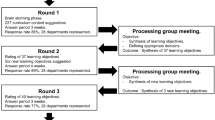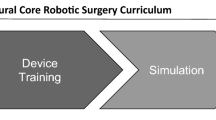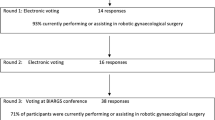Abstract
Background
Currently, no generally accepted curriculum for operating room nurses (OR nurses) working with robotic-assisted surgery (RAS) exists. OR nurses working with RAS require different competencies than regular OR nurses, e.g. knowledge of the robotic system and equipment and specific emergency undocking procedures. The objective of this study was to identify learning goals for a curriculum for OR nurses working with RAS and to investigate which learning methods should be used.
Methods
A three-round Delphi approach, with an additional survey, was used in this study. Four OR nurses from every department in gynecology, urology, and surgical gastroenterology doing RAS in Denmark were invited to participate.
Results
The response rates were 93%, 81%, and 79%, respectively, in the three rounds of the Delphi survey and 68% in the additional survey. After the processing of data, a list of 57 learning goals, sorted under 11 domains, was produced. 41 learning goals were rated Relevant, Very relevant, or Essential spread over 10 of the 11 domains. The top 3 learning goals rated as Essential: Identify the most common injuries related to patient positioning during robotic-assisted surgery and know how to avoid them, Connect, calibrate and handle the scope, Perform an emergency undocking procedure. The panel rated Supervised training during surgery on patients as the most relevant learning method, followed by Dry lab and Team training.
Conclusions
The learning goals identified in this study, can be used as the basis for a curriculum for OR nurses working with RAS. During the processing, it became clear that there is a need to further investigate issues such as communication challenges, awareness of emergency procedures, and differences in the skills required depending on the role of the RAS nurse.
Similar content being viewed by others
Data availability
The datasets used for this study are available from the corresponding author on reasonable request.
References
Intuitive (2022) Intuitive announces preliminary fourth quarter and full year 2021 results. https://isrg.intuitive.com/news-releases/news-release-details/intuitive-announces-preliminary-fourth-quarter-and-full-year-1. Accessed 22 Jan 2022
Francis P (2006) The evolution of robotics in surgery and implementing a perioperative robotics nurse specialist role. AORN J. https://doi.org/10.1016/S0001-2092(06)60191-9
Kang MJ, De Gagne JC, Kang HS (2016) Perioperative nurses’ work experience with robotic surgery: a focus group study. Comput Inf Nurs 34:152–158. https://doi.org/10.1097/cin.0000000000000224
Abdel Raheem A, Song HJ, Chang KD, Choi YD, Rha KH (2017) Robotic nurse duties in the urology operative room: 11 years of experience. Asian J Urol 4:116–123. https://doi.org/10.1016/j.ajur.2016.09.012
Uslu Y, Altınbaş Y, Özercan T, van Giersbergen MY (2019) The process of nurse adaptation to robotic surgery: a qualitative study. Int J Med Robot Comput Assist Surg. https://doi.org/10.1002/rcs.1996
Carlos G, Saulan M (2018) Robotic emergencies: are you prepared for a disaster? AORN J 108:493–501. https://doi.org/10.1002/aorn.12393
Francis P, Winfield HN (2006) Medical robotics: the impact on perioperative nursing practice. Urol Nurs 26:99–104, 107–108
Tiferes J, Hussein AA, Bisantz A, Kozlowski JD, Sharif MA, Winder NM, Ahmad N, Allers J, Cavuoto L, Guru KA (2016) The loud surgeon behind the console: understanding team activities during robot-assisted surgery. J Surg Educ 73:504–512. https://doi.org/10.1016/j.jsurg.2015.12.009
Tiferes J, Hussein AA, Bisantz A, Higginbotham DJ, Sharif M, Kozlowski J, Ahmad B, O’Hara R, Wawrzyniak N, Guru K (2019) Are gestures worth a thousand words? Verbal and nonverbal communication during robot-assisted surgery. Appl Ergon 78:251–262. https://doi.org/10.1016/j.apergo.2018.02.015
Almeras C (2019) Operating room communication in robotic surgery: place, modalities and evolution of a safe system of interaction. J Visc Surg 156:397–403. https://doi.org/10.1016/j.jviscsurg.2019.02.004
Fisher RA, Dasgupta P, Mottrie A, Volpe A, Khan MS, Challacombe B, Ahmed K (2015) An over-view of robot assisted surgery curricula and the status of their validation. Int J Surg 13:115–123. https://doi.org/10.1016/j.ijsu.2014.11.033
Ahmed K, Khan R, Mottrie A, Lovegrove C, Abaza R, Ahlawat R, Ahlering T, Ahlgren G, Artibani W, Barret E, Cathelineau X, Challacombe B, Coloby P, Khan MS, Hubert J, Michel MS, Montorsi F, Murphy D, Palou J, Patel V, Piechaud PT, Van Poppel H, Rischmann P, Sanchez-Salas R, Siemer S, Stoeckle M, Stolzenburg JU, Terrier JE, Thüroff JW, Vaessen C, Van Der Poel HG, Van Cleynenbreugel B, Volpe A, Wagner C, Wiklund P, Wilson T, Wirth M, Witt J, Dasgupta P (2015) Development of a standardised training curriculum for robotic surgery: a consensus statement from an international multidisciplinary group of experts. BJU Int 116:93–101. https://doi.org/10.1111/bju.12974
ERUS robotic curriculum. European Association of Urology. https://uroweb.org/section/erus/education/. Accessed 22 Jan 2022
Fundamentals of robotic surgery. https://frsurgery.org/. Accessed 22 Jan 2022
Collins JW, Dell’Oglio P, Hung AJ, Brook NR (2018) The importance of technical and non-technical skills in robotic surgery training [figure presented]. Eur Urol Focus 4:674–676. https://doi.org/10.1016/j.euf.2018.08.018
Kern DE (2015) Curriculum development for medical education: a six-step approach. Johns Hopkins University Press, Baltimore
Black N, Murphy M, Lamping D, Mckee M, Sanderson C, Askham J, Marteau T (2013) Consensus development methods, and their use in creating clinical guidelines. Adv Handb Methods Evid Based Healthc 2:426–448. https://doi.org/10.4135/9781848608344.n24
McMillan SS, King M, Tully MP (2016) How to use the nominal group and Delphi techniques. Int J Clin Pharm 38:655–662. https://doi.org/10.1007/s11096-016-0257-x
Jones J, Hunter D (1995) Qualitative research: consensus methods for medical and health services research. BMJ 311:376. https://doi.org/10.1136/bmj.311.7001.376
Hackett S, Masson H, Phillips S (2006) Exploring consensus in practice with youth who are sexually abusive: findings from a delphi study of practitioner views in the United Kingdom and the Republic of Ireland. Child Maltreat 11:146–156. https://doi.org/10.1177/1077559505285744
Hertz P, Houlind K, Jepsen J, Bundgaard L, Jensen P, Friis M, Konge L, Bjerrum F (2021) Identifying curriculum content for a cross-specialty robotic-assisted surgery training program: a Delphi study. Surg Endosc. https://doi.org/10.1007/s00464-021-08821-3
Berner JE, Ewertz E (2019) The importance of non-technical skills in modern surgical practice. Cir Esp 97:190–195. https://doi.org/10.1016/j.ciresp.2018.12.007
Wan PAG (2019) RN first assistant (RNFA). In: J. Leg. Nurse Consult. http://www.aalnc.org/page/journal-v2.0. Accessed 24 Jan 2022
Bryant EA (2020) British Columbia’S underutilization of registered nurse first assists: a barrier to achieving the quadruple aim. ORNAC J 38:15–30
Pika R, O’Brien B, Murphy J, Markey K, O’Donnell C (2021) The role of the registered nurse first assistant within the perioperative setting. Br J Nurs 30:148–153. https://doi.org/10.12968/bjon.2021.30.3.148
Holbæk E (2021) DSR. https://dsr.dk/fs/fs2/kompetencekort. Accessed 22 Jan 2022
Rusch P, Kimmig R, Lecuru F, Persson J, Ponce J, Degueldre M, Verheijen R (2018) The society of European robotic gynaecological surgery (SERGS) pilot curriculum for robot assisted gynecological surgery. Arch Gynecol Obstet 297:415–420. https://doi.org/10.1007/s00404-017-4612-5
Acknowledgements
We would like to thank all the participants in the Delphi panel, their departments and hospitals: Rigshospitalet, Herlev Hospital, Zealand University Hospital, Slagelse Hospital, Aalborg University Hospital, Aarhus University Hospital, Region Hospital Herning, Region Hospital Holstebro, Odense University Hospital, Hospital Sønderjylland, Lillebaelt Hospital, and Hospital of South West Jutland.
Funding
This study is funded by CAMES, Copenhagen Academy for Medical Education and Education, Center for HR and Education, and The Capital Region of Denmark. No external funding was received for the work.
Author information
Authors and Affiliations
Corresponding author
Ethics declarations
Disclosures
OR nurses Louise Møller, Ulla Grande, Janne Aukdal, Britt Fredensborg, Helle Kristensen, and Jane Petersson and Drs. Peter Hertz, Flemming Bjerrum, and Lars Konge have no conflicts of interest or financial ties to disclose.
Ethical approval
The study was submitted to the Scientific Ethics Committees of the Capital Region, Denmark, which found that ethical approval was not required (Journal No. H-20074884). All participants gave informed consent.
Additional information
Publisher's Note
Springer Nature remains neutral with regard to jurisdictional claims in published maps and institutional affiliations.
Supplementary Information
Below is the link to the electronic supplementary material.
Rights and permissions
Springer Nature or its licensor (e.g. a society or other partner) holds exclusive rights to this article under a publishing agreement with the author(s) or other rightsholder(s); author self-archiving of the accepted manuscript version of this article is solely governed by the terms of such publishing agreement and applicable law.
About this article
Cite this article
Møller, L., Hertz, P., Grande, U. et al. Identifying curriculum content for operating room nurses involved in robotic-assisted surgery: a Delphi study. Surg Endosc 37, 2729–2748 (2023). https://doi.org/10.1007/s00464-022-09751-4
Received:
Accepted:
Published:
Issue Date:
DOI: https://doi.org/10.1007/s00464-022-09751-4




